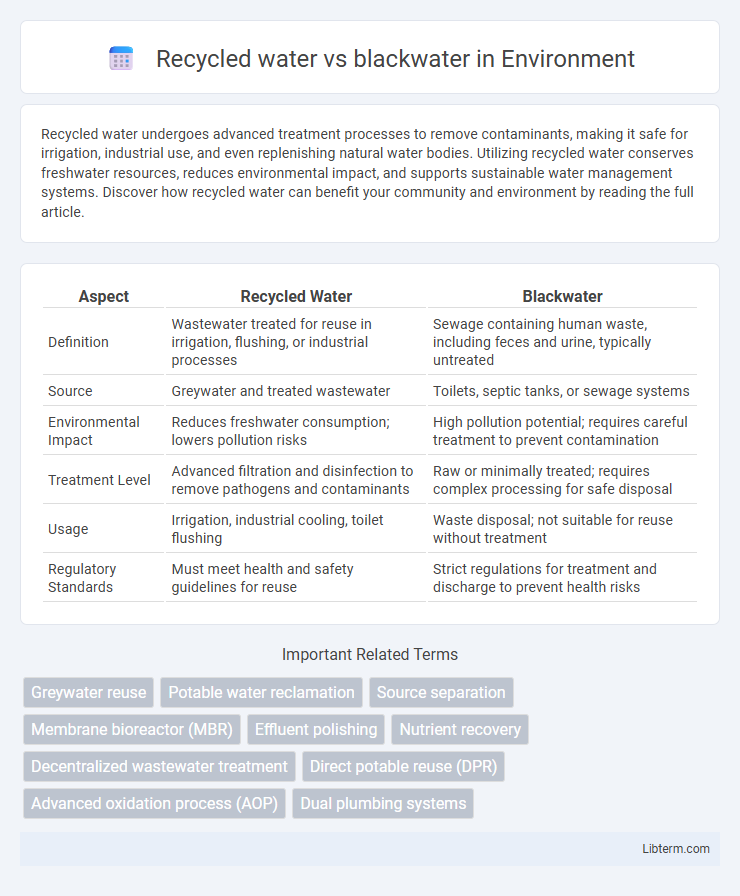Recycled water undergoes advanced treatment processes to remove contaminants, making it safe for irrigation, industrial use, and even replenishing natural water bodies. Utilizing recycled water conserves freshwater resources, reduces environmental impact, and supports sustainable water management systems. Discover how recycled water can benefit your community and environment by reading the full article.
Table of Comparison
| Aspect | Recycled Water | Blackwater |
|---|---|---|
| Definition | Wastewater treated for reuse in irrigation, flushing, or industrial processes | Sewage containing human waste, including feces and urine, typically untreated |
| Source | Greywater and treated wastewater | Toilets, septic tanks, or sewage systems |
| Environmental Impact | Reduces freshwater consumption; lowers pollution risks | High pollution potential; requires careful treatment to prevent contamination |
| Treatment Level | Advanced filtration and disinfection to remove pathogens and contaminants | Raw or minimally treated; requires complex processing for safe disposal |
| Usage | Irrigation, industrial cooling, toilet flushing | Waste disposal; not suitable for reuse without treatment |
| Regulatory Standards | Must meet health and safety guidelines for reuse | Strict regulations for treatment and discharge to prevent health risks |
Introduction to Recycled Water and Blackwater
Recycled water refers to treated wastewater that is purified for non-potable uses such as irrigation, industrial processes, and groundwater recharge, helping conserve freshwater resources. Blackwater is wastewater containing human excrement and urine, typically requiring more advanced treatment due to higher levels of contaminants and pathogens. Understanding the treatment processes and potential applications of recycled water versus blackwater is essential for sustainable water management and environmental protection.
Defining Recycled Water and Its Sources
Recycled water, also known as reclaimed water, is treated wastewater that is purified for non-potable uses such as irrigation, industrial processes, and groundwater recharge. Sources of recycled water typically include treated municipal wastewater, stormwater runoff, and greywater from household sinks and showers. Unlike blackwater, which contains raw sewage and high levels of contaminants from toilets, recycled water undergoes extensive treatment to remove pathogens and pollutants, making it safe for specific reuse applications.
What is Blackwater? Characteristics and Challenges
Blackwater refers to wastewater containing human waste from toilets, characterized by high levels of organic matter, pathogens, and nutrients such as nitrogen and phosphorus. It presents significant treatment challenges due to its potential health risks and environmental impact, requiring advanced processes like disinfection and biological treatment to safely manage contaminants. The management of blackwater is critical in preventing waterborne diseases and protecting water ecosystems.
Key Differences Between Recycled Water and Blackwater
Recycled water is treated wastewater that has undergone purification to remove contaminants, making it suitable for non-potable uses such as irrigation and industrial processes, while blackwater refers to wastewater from toilets containing human waste and pathogens. Key differences include the treatment level, with recycled water receiving advanced purification to meet regulatory standards, whereas blackwater is raw sewage requiring extensive processing before reuse. Additionally, recycled water is safe for controlled reuse applications, whereas untreated blackwater poses health risks and environmental hazards.
Treatment Processes: Recycled Water vs Blackwater
Recycled water treatment involves advanced processes such as filtration, disinfection, and sometimes nutrient removal to ensure safety for non-potable uses, while blackwater treatment requires comprehensive methods including primary sedimentation, anaerobic digestion, and secondary biological treatment to remove pathogens and organic matter. Membrane bioreactors and ultraviolet disinfection are often employed in recycled water systems to meet stringent quality standards, contrasting with blackwater treatment's emphasis on sludge stabilization and effluent nutrient reduction. These targeted treatment processes enable recycled water to be reused effectively, whereas blackwater treatment primarily focuses on safe disposal and environmental protection.
Safety Considerations for Each Water Type
Recycled water undergoes rigorous treatment processes to remove pathogens, chemicals, and contaminants, making it safe for non-potable uses such as irrigation and industrial applications, but it is not recommended for direct human consumption due to potential health risks. Blackwater, containing untreated sewage and fecal matter, presents significant health hazards and requires advanced treatment technologies like anaerobic digestion and disinfection to eliminate harmful microorganisms and pathogens before any reuse or discharge. Safety considerations emphasize strict regulatory compliance, continuous monitoring for contaminants like E. coli and heavy metals, and public education to prevent exposure-related illnesses associated with both water types.
Common Uses for Recycled Water
Recycled water is commonly used for irrigation in agriculture and landscaping, reducing the demand on freshwater supplies. It supports industrial processes such as cooling systems and boiler feedwater, enhancing sustainable water management. Recycled water also plays a crucial role in groundwater recharge and environmental restoration projects, promoting resource conservation.
Risks and Hazards of Using Blackwater
Blackwater, containing sewage and organic waste, poses significant risks such as the spread of pathogens, including bacteria, viruses, and parasites, which can lead to severe health hazards. Exposure to untreated blackwater increases the chances of waterborne diseases like cholera, dysentery, and hepatitis. In contrast, recycled water undergoes rigorous treatment processes to minimize these health risks, making it safer for non-potable uses.
Environmental Impact Comparison
Recycled water significantly reduces environmental pollution by minimizing wastewater discharge and conserving freshwater resources, whereas blackwater contains high levels of contaminants and requires extensive treatment to prevent ecosystem damage. The reuse of recycled water supports sustainable water management by lowering energy consumption and greenhouse gas emissions associated with conventional wastewater treatment. In contrast, improper handling of blackwater can lead to soil and water contamination, harming biodiversity and public health.
Future Trends in Water Reuse and Management
Future trends in water reuse emphasize advanced treatment technologies transforming blackwater into highly purified recycled water suitable for diverse applications, promoting sustainability and resource efficiency. Innovations like membrane bioreactors and advanced oxidation processes enhance contaminant removal, enabling safe reuse in agriculture, industrial processes, and urban settings. Integration of smart monitoring systems and regulatory frameworks supports scalable adoption of recycled water, addressing global water scarcity and environmental challenges.
Recycled water Infographic

 libterm.com
libterm.com